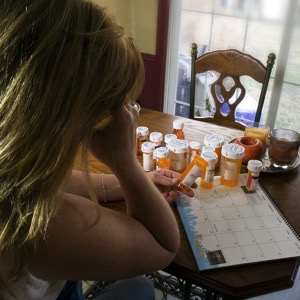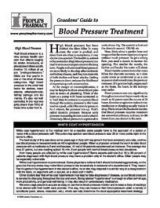
Before you start taking any new medicine, it makes sense to ask about potential interactions with the drugs you are already taking. It is a good thing one reader asked about potential interactions between blood pressure medication and an antibiotic. The combination could trigger lethal consequences.
Does the Antibiotic Bactrim Interact with Quinapril?
Q. Bactrim is the only antibiotic that works well for me. Would it interact with the quinapril I take for my blood pressure?
A. Please contact your physician and pharmacist immediately. The combination of an ACE inhibitor like quinapril or lisinopril with an antibiotic such as co-trimoxazole (Bactrim or Septra) could be life threatening (BMJ, Oct. 30, 2014).
ACE inhibitors can lead to increased potassium levels. (Here is a list of ACE inhibitors and a description of some serious side effects.) Usually people taking an ACE inhibitor for blood pressure don’t have to worry about excess potassium. But adding co-trimoxazole to the mix changes that completely.
Too Much Potassium!
With this combination, potassium can rise quickly and lead to cardiac arrest. Symptoms of this condition (hyperkalemia) include heart palpitations, nausea, tingling or numbness in the lips, feet or fingers, trouble breathing, fatigue, weakness, slow pulse and confusion. You can read more about this interaction and how to avoid other dangerous combinations here.
To learn more about ACE inhibitors like quinapril and other ways to control blood pressure, you may want to read our Guide to Blood Pressure Treatment.



WilliamE
Ontario, Canada
I am an 85 year old man who had a toe infection that resulted from a gout attack. I checked at the local hospital clinic for my toe and I was told that I had to take antibiotics to clear the infection. I was given CEPHALEXIN 500MG (4 times a day) to be taken for 10 days. At the end of 10 days my infection seemed to have gone, but the side effects of this antibiotics were tough: diarrhea, upset stomach etc.
I was called by the physician and told that the infection was still there, from the xrays they took for the bone scan and told that since the oral antibiotics had not cured the infection I had to take an intravenous antibiotic for 8 days. I was surprised because I was feeling better already. The nurse gave me the first dose in the hospital and arranged for home care came to give me the next injection the following day. On the third day of the intravenous shot, I was very sleepy and lethargic and out of sorts. Early morning of the fourth day, my wife found me in an unresponsive state, like I was struggling for air and couldn’t talk. Paramedics were called, and the conclusion was that I was dehydrated and sent home, but to keep on taking the intravenous antibiotic. The next day almost 24 hours later ((4th dose) I passed out again and was given a whiff of oxygen to come around.
When I asked the attending physician about the interaction of antibiotics with my blood pressure medication, they won’t comment on it. I have never passed out and have never had anything like this happen in all my years. I have been asked not to drive till I see a cardiologist. Since stopping the antibiotics, I am my old self again.
We trust doctors and expect them to know what is the right medication for us, and even though I repeatedly said that I was not feeling well with the second round of antibiotic I was told to keep on taking it. Yes, we all should ask more questions before taking medications that might interact with blood pressure medications.
RANDY
I recently was prescribed a Septra generic for a urinary tract infection. I have been taking 10 mg of Losinipril once daily for at least 10 years. On the sixth day of taking these two commonly prescribed medications I started feeling nauseous and weak (I never actually vomited) and decided to go to a local urgent care clinic.
The PA diagnosed me with dehydration and urged me to go straight to the ER of the hospital to get testing to see what was causing my kidneys to shut down. I drove my self to the ER and test revealed that I had suffered a mild heart attack. IV fluids restored my kidney function to a level that the cardiologist felt it was safe to do a cardiac cathurization. The cathurization confirmed no blockage and normal arteries. I was discharged 5 hours later and asked to return in 6 weeks for a follow up with the cardiologist. I have never been diagnosed with high cholesterol or heart disease.
I am 72 years old and a licensed private pilot that is now faced with suspension of my medical certificate all because, in my opinion, I was prescribed these two common medications.
Mary
Virginia
I, too, had taken PPIs for a number of years. About 2 years ago my doctor (who had given me the PPIs) said my lab work indicated I had a kidney problem. I was sent to a specialist who, at my first visit, took me off the PPIs. I was also in stage 3 kidney failure!! Last lab work indicated that I am now stage 2. I was really upset that my doctor for many years, and whom I trusted, had allowed me to take these meds so long. I urge everyone to be aware of drug interactions. With the internet one can find a lot of information, and it is worth the time to check on side effects and interaction of drugs! It IS IMPORTANT!
L
the South
This explains some reactions a friend of mine has with challenging high blood pressure and taking antibiotics ahead of several surgeries. He has another one coming up so we’ll do this research ahead of him adding to his list of medications. (He does not read well nor do good research, rather is too trusting of the medical community,) Result has been too many trips to the ER without them making this connection.